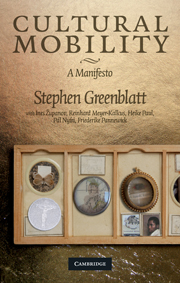Book contents
- Frontmatter
- Contents
- List of authors
- List of illustrations
- Acknowledgments
- 1 Cultural mobility: an introduction
- 2 “The Wheel of Torments”: mobility and redemption in Portuguese colonial India (sixteenth century)
- 3 Theatrical mobility
- 4 World literature beyond Goethe
- 5 Cultural mobility between Boston and Berlin: how Germans have read and reread narratives of American slavery
- 6 Struggling for mobility: migration, tourism, and cultural authority in contemporary China
- 7 Performativity and mobility: Middle Eastern traditions on the move
- 8 A mobility studies manifesto
- Index
4 - World literature beyond Goethe
Published online by Cambridge University Press: 05 June 2012
- Frontmatter
- Contents
- List of authors
- List of illustrations
- Acknowledgments
- 1 Cultural mobility: an introduction
- 2 “The Wheel of Torments”: mobility and redemption in Portuguese colonial India (sixteenth century)
- 3 Theatrical mobility
- 4 World literature beyond Goethe
- 5 Cultural mobility between Boston and Berlin: how Germans have read and reread narratives of American slavery
- 6 Struggling for mobility: migration, tourism, and cultural authority in contemporary China
- 7 Performativity and mobility: Middle Eastern traditions on the move
- 8 A mobility studies manifesto
- Index
Summary
The notion of Weltliteratur, or “world literature,” which Goethe introduced in 1827, has recently found growing popularity among literary scholars, who increasingly regard world literature as their primary and necessary sphere of competence. World literature, which for Goethe was something that yet lay on the horizon, something to work toward, would today seem to have become a reality.
Berlin can serve as an example of this in the same way that Paris, London, and New York can in other respects. Anyone attempting to write a guide to literary Berlin would no longer be able to limit themselves to German authors but would have to also consider authors working in Arabic, Russian, English, French, Swedish, or other languages, among them the Nobel Prize winner Imre Kertész, writing in his native Hungarian, as well as Syrians, Iranians, and Turks who pen their works in German and who have developed followings in Germany but still remain relatively unknown in their lands of origin.
No longer viable is the old model of literary scholarship in which a single nation or region and its language or language family is the focus. It is becoming increasingly difficult to relegate authors to a single culture and nation – they live and write in the spaces between.
- Type
- Chapter
- Information
- Cultural MobilityA Manifesto, pp. 96 - 121Publisher: Cambridge University PressPrint publication year: 2009



